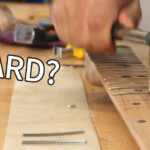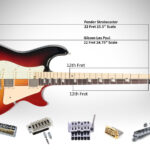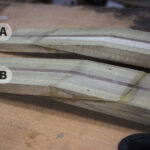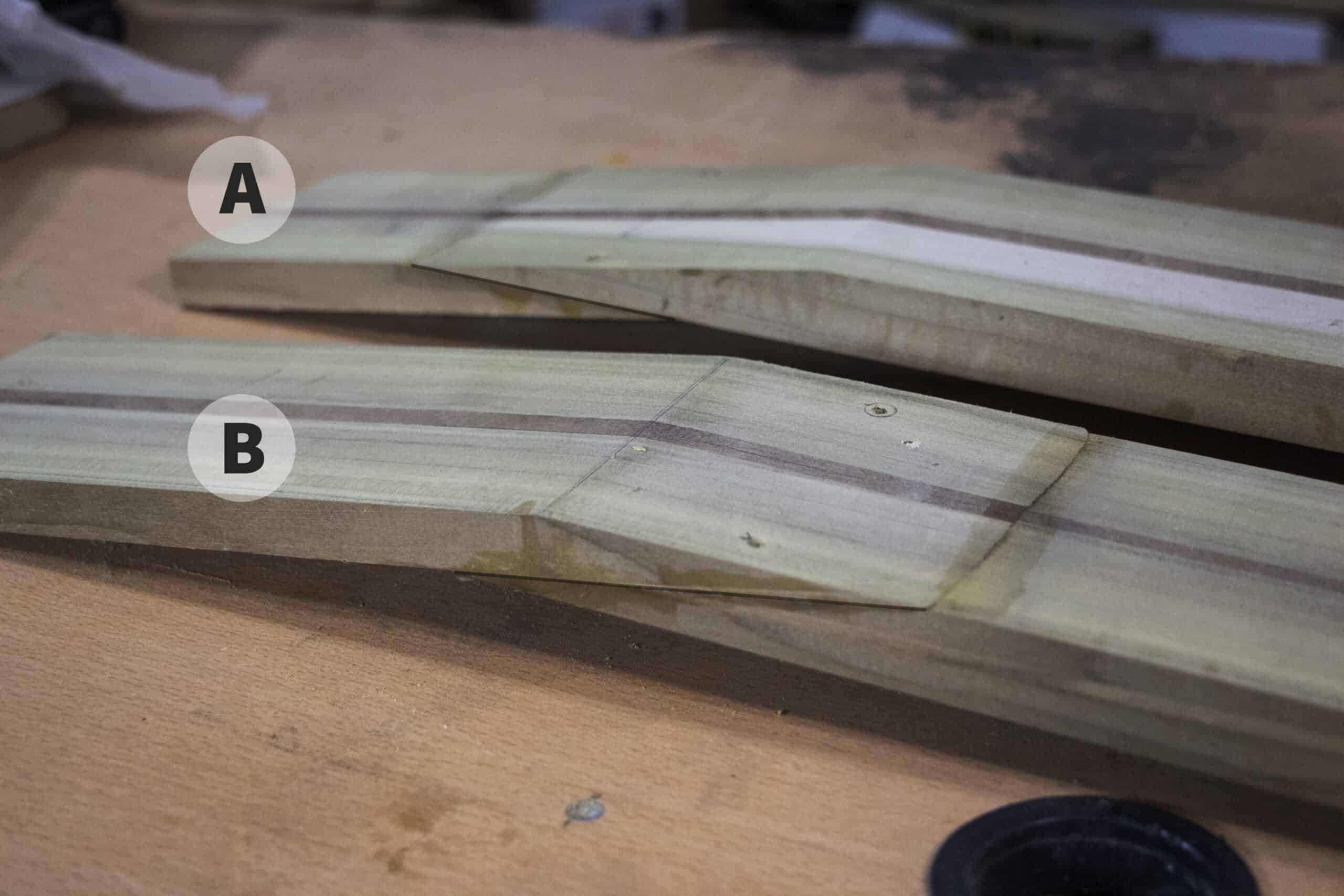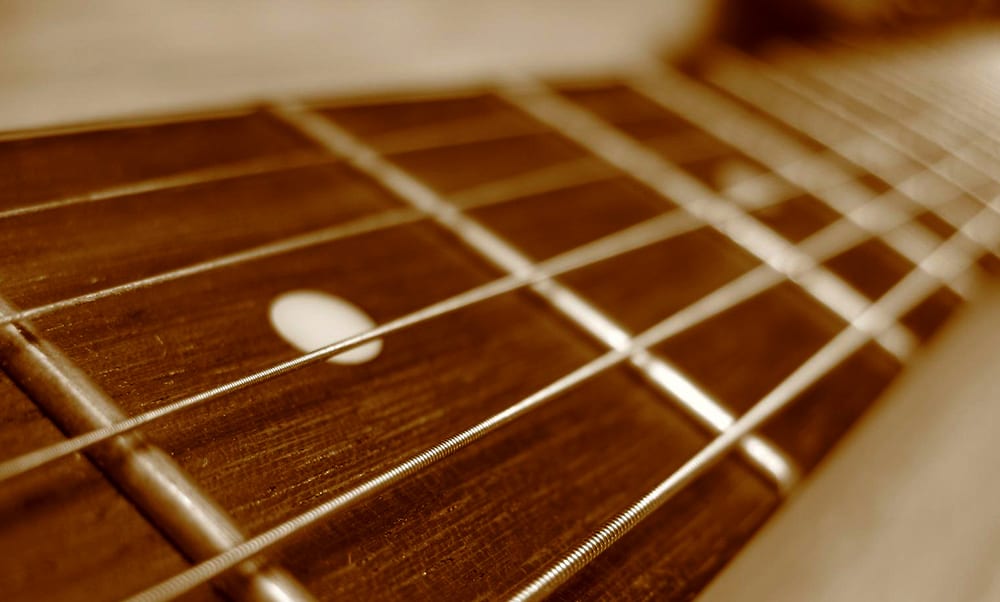Guitars can start at 150$ for the budget lines and end in the thousands for custom shop guitars and even more for boutique Luthiers. Building your own guitar is becoming more and more popular with accessible guitar kits and weekend courses for building guitars from scratch. So we know that there are several routes to building your own guitar but a few questions remain.
Is building a guitar yourself cheaper?
Looking strictly at the cost of the parts and materials the answer would be a soft yes. Barely, though there is potential there. But (there is always a but), if you take into account the cost of tools there is a good chance you have already surpassed the cost of a cheap guitar.
There are many variables and options here, so, lets try and break it down to see exactly where and when the numbers are in our favor, and when building your own guitar, while may seem like a nice, romantic, notion, is not really the most economic decision.
How much does it cost to build your own guitar?
I recently did a full rundown on all the parts and their prices – ‘What would it cost me to build an electric guitar’, and if we are looking at the cheapest alternative, the parts come to about 120$. These will be generic, off brand parts, found on Amazon or ordered directly from Aliexpress or similar sites. Also made a video on the subject:
This price does not include the cost of the wood used for both the body and the neck. You may be able to source those locally and maybe even use ‘reclaimed’ wood or a slab you have laying around. Buying a body blank might will bump your budget by at least 60$ for a simple Alder 2 piece at Solo Music Gear, (much more at Stew-Mac), and a blank Maple neck will start around 29$. The simple math, will put you at 259$ as the bare minimum starting point, or 120$ if you can find proper timber for less.
When is building your own guitar worth it?
Worth can measured as emotional or financial value. One will judge the guitar by it cost vs. a similar guitar in the store. The other will look at what it means to you, as the person who built it.
Understanding cost and quality
At the very low end of the guitar price spectrum, it is very hard to compete with mass-produced guitars. They have much better access to parts and materials and maximize the cost of labor. However, in the mid-range prices of guitars, you may be able to build a guitar that is equivalent to or better than a similarly priced guitar. There are reasons (other than marketing) that you can get a Squire Strat for under 200$ and a Fender Strat will cost closer to 1500$. The same is true for Epiphone vs Gibson. Putting labor costs aside, the difference is in the parts and the attention to details and that gives you a lot of room to make a difference. Now, the differences will include the quality of the materials themselves, from the wood, the type of steel, the chrome plating to the copper wire in the pickups. It will also have to do with the amount of time and attention put into the fretting job, the finishing, and the paint job. That is not saying Epiphones or Squires are badly made, but not as well made as their more expensive counterparts. In Fact, I find it amazing that you can get a guitar like a Squire Strat for 200$ or less on sale when even the cheapest parts and materials will cost me more. And this is a fine guitar.
Building a guitar that is cost effective
Your edge when building your own guitar is the option to put in that extra time and effort that cheaper guitar makers will skip for the sake of cutting down on cost. You can also choose to install better hardware on your guitar, while still maintaining a much lower overall cost. The three most critical parts you would want to improve on, are pickups when it comes to sound, the tuners, when it comes to playability, and the bridge. In fact, when you look at the comparison I did (‘What would it cost me to build an electric guitar’,) between buying the cheapest hardware on the market and premium equivalent, you will see the difference is about 500$ on average. This means that in theory, you can build a guitar that will have the same quality hardware, or even better than a 1500$ guitar, for half the price.
The difference between theory and practice
As much as it sounds great there is a lot more that goes into the quality of a guitar than fancy hardware. To build a guitar from scratch, that will rival even a 300$ guitar, there are two things you will need aside from good hardware. The right tools and the know-how.
Tools for guitar building are also a cost to consider
Building a guitar from scratch requires a multitude of tools even the average DIY hobbyist will not have in their garage or workshop. Aside from standard woodworking tools which will easily amount to 4-digit cost, you will also need so more Lutherie-specific tools for shaping and fretting your neck. On top of that, a soldering kit will be required, and we haven’t even got to all the painting and polishing, which is a whole subject by itself. A first-time builder has to take at least some of these costs if building a guitar for saving money is the goal here.
Building a guitar is complex – there is a learning curve
Lutherie is partly technical and partly an art form. While building a guitar is certainly something you can learn from a book, off youtube, or even in a short course, it is a multidisciplinary project and there are a lot of areas of expertise to learn and perfect. While this can be a lot of fun, it will also require time and practice. In other words, there is a good chance you will make mistakes, mess things up, and may not get a perfect guitar on your first attempt. That also means that even with the best hardware money could buy the guitar you build will not compare to that 1500$ you were shooting for. It may be the look and finish; it may be the comfort and playability or a number of other details.
So, budget-wise, is it worth it?
On a strict dollar amount-based analysis, I would have to say, that in most cases the answer would have to be no. However, if you are either extremely gifted, lucky, or took the time to learn it properly (maybe made a couple of crappy guitars along the way), and you already have the majority of the necessary tools, you could make wonderful custom guitars for a significantly lower cost than similar ones in the store.
Is building your own guitar worth it though?
On a personal level, and very subjectively speaking, building your own guitar is very much worth it. It allows me to work with wood, be creative, learn some new skills and improve others I have. It also gives me an excuse to dive into aspects of the guitar world I previously was not familiar with and at the end of the process, I even get to have another guitar to play with or even just hang on the wall. The whole thing costs just a few hundred dollars. Compared to other hobbies, it’s a steal.
What are the other cheap alternatives?
There are plenty of alternatives to building a guitar from scratch. The first thing you need to ask yourself is what you want the guitar for and why you want to build it in the first place. If all you are looking for is the cheapest guitar you can get, you can find deals for 150$ including bag and shipping (in the US) or even just pop into Walmart and find a set of Squire or Epiphone with a matching Amp for 250$ (That’s hard to beat).
If you do want to be involved in the making of the guitar, to make it ‘your own’, and to make it significantly better there are two good options.
Build a kit guitar
For many people who want to build their own guitar, a kit build may just be the perfect solution. Some may say, that it’s not ‘actual’ guitar building, blah, blah blah. Who cares, you’re not starting a career as a Luthier, you just want to build a guitar. Now, if YOU want to build from scratch, that’s a different story. Kits will include all the parts you need for a guitar and will include a body and a neck, which in most cases will be unfinished. However, the neck will have a truss-rod already built-in, and the frets will be installed. This means that a lot of the carpentry and heavy lifting will have already been done for you, plus the fretting which is one of the more complex (and critical) parts of guitar building. To make things even easier (if you are looking for that) there are more and more kits today that do come finished so no sanding and painting are required. For the Soldering timid there are also ‘Solderless Guitar Kits’. The benefit of that is that you will not need too many tools, and if you are a bit of a handy-man yourself, you may already have all the tools you need.
Kits are a great base to start from
Most of the work on a guitar kit, is assembly, although, for most unfinished kits, you will also need to oil, color, and/ or varnish it. This is where you can really go ‘all-out’ and make a unique guitar. Assuming time is not the issue, you can spend as much time as you wish on the finish as the rest of it should take just a few hours. What you will usually get by the end, is a decent guitar with relatively generic hardware Starting with 120$-210$ for most standard models, and going up to 330$ for double necks. Stew- mac will have Wilkinson Kits for up to 500$. This can be a great option for a beginner or as a base for upgrades which can also be done on the basic level guitar you buy.
Buy a cheap guitar and upgrade it
You can find a cheap new guitar or even a decent second-hand guitar and find which upgrades will give the best ‘bang for the buck’. These will usually the pickups, the tuners, and maybe the bridge. Another upgrade which has less to do with money and more with work is a good fret job.
Improving the Neck
Most cheaper guitars will come with a fretboard that is correct and properly built but did not receive the extra attention you would expect from premium guitars. If the neck is badly bent or twisted it may be beyond repair and surely beyond this post, but with most necks that is not the case. What we are talking about is a thorough fret job, including leveling, recrowning, and polishing. This will include smoothing the tips and bringing the frets to a shiny state where they will be smooth to the touch and extreme string bending. I go into greater details in ‘Buy a cheap guitar neck and make it Amazing’. You will need some basic tools for that but if you play guitar and are a hands-on kind of guy or gal, you may already have a basic Guitar Set-Up Kit. If you are thinking of any type of guitar building you will probably want to invest in a Full Fret Leveling Kit
Basic Hardware Upgrade
Switching cheap generic pickups to good ones can substantially improve the sound of the guitar. The bridge on one end and the tuners on the other can improve the tunning and playability. With a wide variety of guitars and options of hardware the range. Good mid-range pickups will cost between 40$ to 120$ and above that, you get into some very serious pickups. You can get very good bridges and machine heads for 40$-80$ (each) and top-shelf aftermarket when spending more than 100$.

